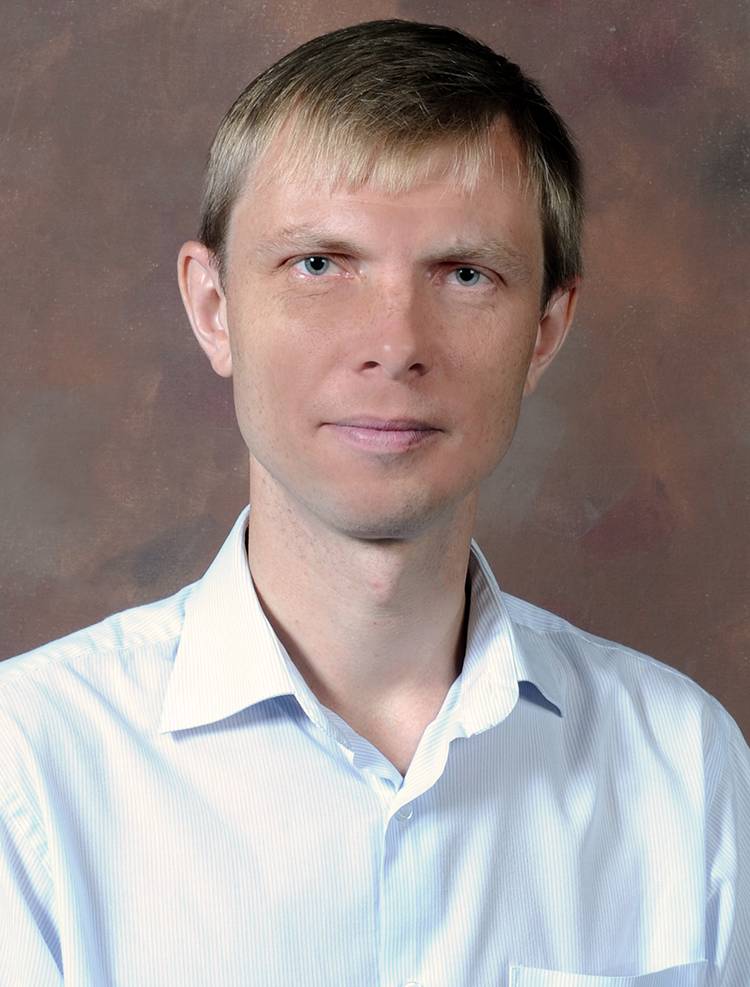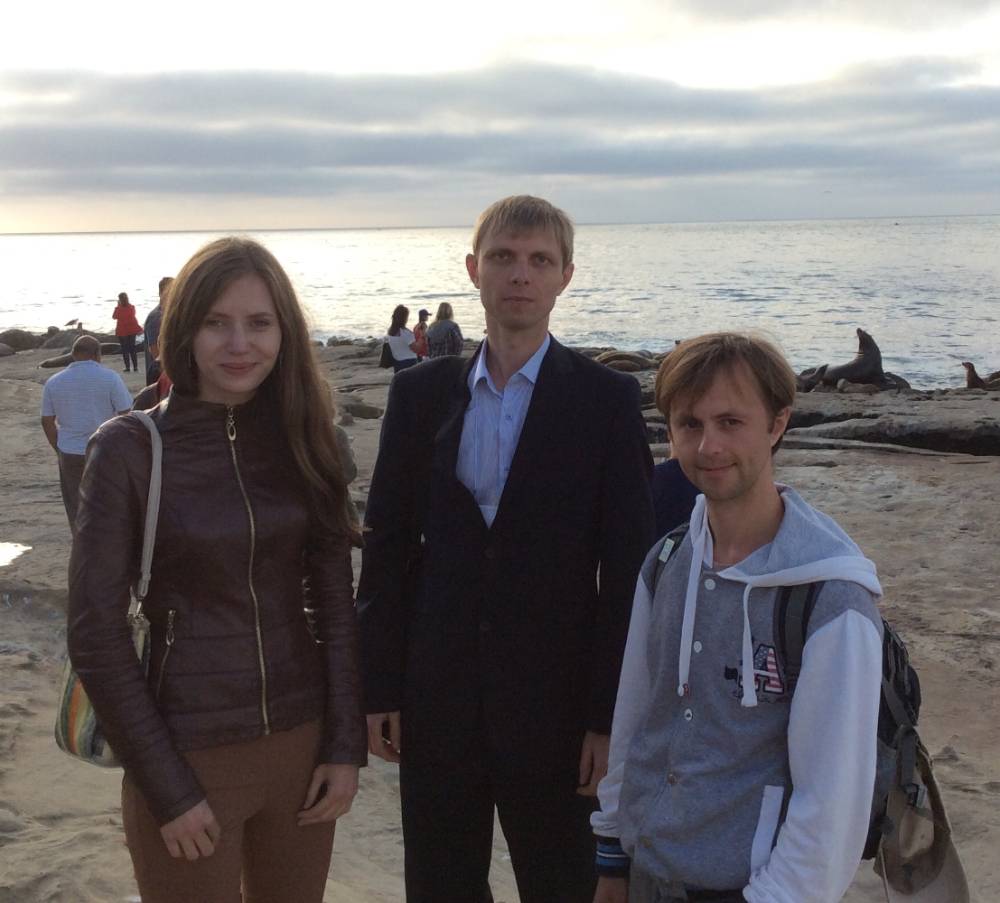- Augusta University
- Colleges & Schools
- Medical College of Georgia
- Physiology
- Faculty | Physiology
- Mykola Mamenko, PhD
Mykola Mamenko, PhD
Assistant Professor

Phone: (706) 721-2576
Fax: (706) 721-7299
Email: mmamenko@augusta.edu
Office: CA-3147
Lab: CA-3132G
Learn more about Dr. Mamenko's Research
Education and Training
1998-2002 – BS in biology, Taras Shevchenko National University of Kyiv, Ukraine
2002-2004 – MS in biophysics, Taras Shevchenko National University of Kyiv, Ukraine
2007-2010 – PhD in biophysics, Bogomoletz Institute of Physiology, Kyiv, Ukraine
2010-2015 – Postdoctoral Fellow, Department of Integrative Biology and Pharmacology, McGovern Medical School, the University
of Texas Health Science Center at Houston
Academic Appointments
2015-2017 – Instructor, Department of Integrative Biology and Pharmacology, McGovern Medical School, the University of Texas Health Science Center at Houston
2017-present – Assistant Professor (Tenure track), Department of Physiology, Medical College of Georgia, Augusta University
Research Interests
The collecting duct (CD) system of the kidney is the final compartment to affect body’s fluid and electrolyte balance through fine-tuning of urinary volume and composition. Not surprisingly, disruption of normal CD function results in numerous pathological states and diseases. Transport systems in CD cells are under control of systemic hormones, paracrine and autocrine factors, as well as changes in tubular fluid osmolality and flow rate. CD cells ubiquitously employ Ca2+ as a second messenger to adjust epithelial transport in response to this wide array of stimuli. Yet, mechanisms and pathways governing Ca2+ mobilization in CD cells still remain poorly understood.
We aim to unravel the molecular nature of Ca2+ signaling in the CD and to define its role in regulation of water and electrolyte homeostasis under normal and pathological conditions. My experimental arsenal includes direct monitoring of ion channel activity with patch-clamp electrophysiology, fluorescent Ca2+-imaging, confocal microscopy, biochemical, molecular biology tools and genetic approaches. Our laboratory has demonstrated that Ca2+ influx via TRPV4 channel is critical for mechanosensitive response of CD cells to elevated tubular flow. We also found that TRPV4 determines a sustained phase of ATP-induced Ca2+ response, implicated in inhibition of Na+ reabsorption in the CD. Importantly, we showed that a devastating disorder – polycystic kidney disease (PKD), is associated with disrupted [Ca2+]i homeostasis, markedly impaired TRPV4 activity, loss of flow-mediated and prolonged ATP-induced [Ca2+]i signaling. Augmentation of TRPV4 activity drastically attenuates renal PKD manifestations, restores [Ca2+]i balance and purinergic signaling. Recently we identified that [Ca2+]i mobilization via store operated Ca2+ entry (SOCE) in CD cells is pivotal for vasopressin-regulated renal water handling. SOCE disruption results in nephrogenic diabetes insipidus (NDI), while stimulation of SOCE rejuvenates vasopressin-activated [Ca2+]i signaling and significantly improves the ability of kidneys to concentrate urine.
Currently, our research activity is aimed at establishing the contribution of intracellular calcium signaling in renal epithelial cells into water and electrolyte handling by the kidney and at revealing novel mechanisms associated with PKD and NDI.
We are actively pursuing a few lines of inquiry:
probing the role of SOCE and TRPV4-dependent [Ca2+]i signaling in renal water and electrolyte handling,
determining the contribution of defective SOCE and disrupted TRPV4 function to lithium-induced NDI and PKD,
targeting SOCE and TRPV4 to rescue NDI and autosomal dominant PKD manifestations observed in experimental animal models.
Awards and honors
2017 American Physiological Society (APS) Renal Section Research Recognition Award
2017 APS Renal Section Research Recognition Award
2015 The University of Texas Medical School Dean’s Excellence in Research Award
2015 The American Physiological Society Renal Section Postdoctoral Excellence in Research Award
2015 The Society of Experimental Biology and Medicine Young Investigator Award
2014 Postdoctoral award for the best oral presentation at the University of Texas Health Science Center at Houston Cell and Regulatory Biology Program Meeting
2013 Postdoctoral award for the best oral presentation at the University of Texas Health Science Center at Houston Cell and Regulatory Biology Program Meeting
2010 Personal stipend for young scientists from the National Academy of Sciences of Ukraine
2009 Scholarship from the World Federation of Scientists, Geneva, Switzerland
Representative Publications
|
Cherezova A, Tomilin V, Buncha V, Zaika O, Ortiz PA, Mei F, Cheng X, Mamenko M, Pochynyuk O. Urinary concentrating defect in mice lacking Epac1 or Epac2. FASEB J. 2018 Sep 25:fj201800435R. doi: 10.1096/fj.201800435R. [Epub ahead of print] PMID: 30252533 |
|
Mamenko M, Zaika O, Tomilin V, Jensen VB, Pochynyuk O. Compromised regulation of the collecting duct ENaC activity in mice lacking AT1a receptor. J Cell Physiol. 2018 Sep;233(9):7217-7225. doi: 10.1002/jcp.26552. Epub 2018 Mar 25. PMID: 29574718 |
|
Prieto MC, Reverte V, Mamenko M, Kuczeriszka M, Veiras LC, Rosales CB, McLellan M, Gentile O, Jensen VB, Ichihara A, McDonough AA, Pochynyuk OM, Gonzalez AA. Collecting duct prorenin receptor knockout reduces renal function, increases sodium excretion, and mitigates renal responses in ANG II-induced hypertensive mice. Am J Physiol Renal Physiol. 2017 Dec 1;313(6):F1243-F1253. doi: 10.1152/ajprenal.00152.2017. Epub 2017 Aug 16. PMID: 28814438 |
|
Mamenko M. V., Boukelmoune N., Tomilin V. N., Zaika O. L., Jensen V. B., O’Neil R. G. and Pochynyuk O. M. (2017) The renal TRPV4 channel is essential for adaptation to increased dietary potassium. Kidney International. [Accepted for publication]. |
|
Mamenko M., Dhande I., Tomilin V., Zaika O., Boukelmoune N., Zhu Y., Gonzalez-Garay M. L., Pochynyuk O. and Doris P. A. (2016) Defective Store-Operated Calcium Entry Causes Partial Nephrogenic Diabetes Insipidus. J Am Soc Nephrol 27(7):2035-48. |
|
Zaika O., Mamenko M., Boukelmoune N., Pochynyuk O. (2015) IGF-1 and insulin exert opposite actions on ClC-K2 activity in the cortical collecting ducts. Am J Physiol Renal Physiol. 308(1):F39-48. |
|
Berrout J., Mamenko M., Zaika O.L., Chen L., Zang W., Pochynyuk O., and O’Neil R.G. (2014). Emerging role of the calcium-activated, small conductance, SK3 K+ channel in distal tubule function: Regulation by TRPV4. PLoS ONE 9: e95149. |
|
Mamenko M.*, Zaika O.*, Prieto M. C., Jensen V. B., Doris P. A., Navar L. G., Pochynyuk O.(2013) Chronic Angiotensin II Infusion Drives Extensive Aldosterone-Independent Epithelial Na+ Channel Activation. Hypertension. 62(6): 1111-1122. |
|
Mamenko M., Zaika O., Boukelmoune N., Berrout J., O'Neil R. G., Pochynyuk O. (2013) Discrete Control of TRPV4 Function in the Distal Nephron by PKA and PKC. J Biol Chem. 288(28): 20306-20314. |
|
Zaika O.*, Mamenko M.*, Berrout J., Boukelmoune N., O'Neil R. G., Pochynyuk O. (2013) TRPV4 Dysfunction Promotes Renal Cystogenesis in Autosomal Recessive Polycystic Kidney Disease. J Am Soc Nephrol. 24(4):604-616. |
|
Mamenko M., Zaika O., Doris P. A., and Pochynyuk O. (2012) Salt Dependent Inhibition of ENaC-mediated Sodium Reabsorption in the Aldosterone-Sensitive Distal Nephron by Bradykinin. Hypertension. 60(5):1234-1241. |
|
Mamenko M.*, Zaika O.*, Ilatovskaya D. V., Staruschenko A., Pochynyuk O. (2012) Angiotensin II increases activity of the Epithelial Na+ Channel (ENaC) in the distal nephron additively to aldosterone. J Biol Chem. 287(1):660-671. |
|
Mamenko M., Zaika O., Jin M., O'Neil R.G., Pochynyuk O. (2011) Purinergic activation of Ca2+-permeable TRPV4 channels is essential for mechano-sensitivity in the aldosterone-sensitive distal nephron. PLoS One. 6(8):e22824. |
|
Zaika O.*, Mamenko M.*, O’Neil R. G., and Pochynyuk O. (2011) Bradykinin acutely inhibits activity of the epithelial Na+ channels (ENaC) in mammalian aldosterone-sensitive distal nephron. Am J Physiol Renal Physiol. 300(5): F1105-1115. |
* – equal contribution
Related Links
 Pictured from left to right: Alena Cherezova, Dr. Mykola Mamenko, Vadym Buncha (2018)
Pictured from left to right: Alena Cherezova, Dr. Mykola Mamenko, Vadym Buncha (2018)